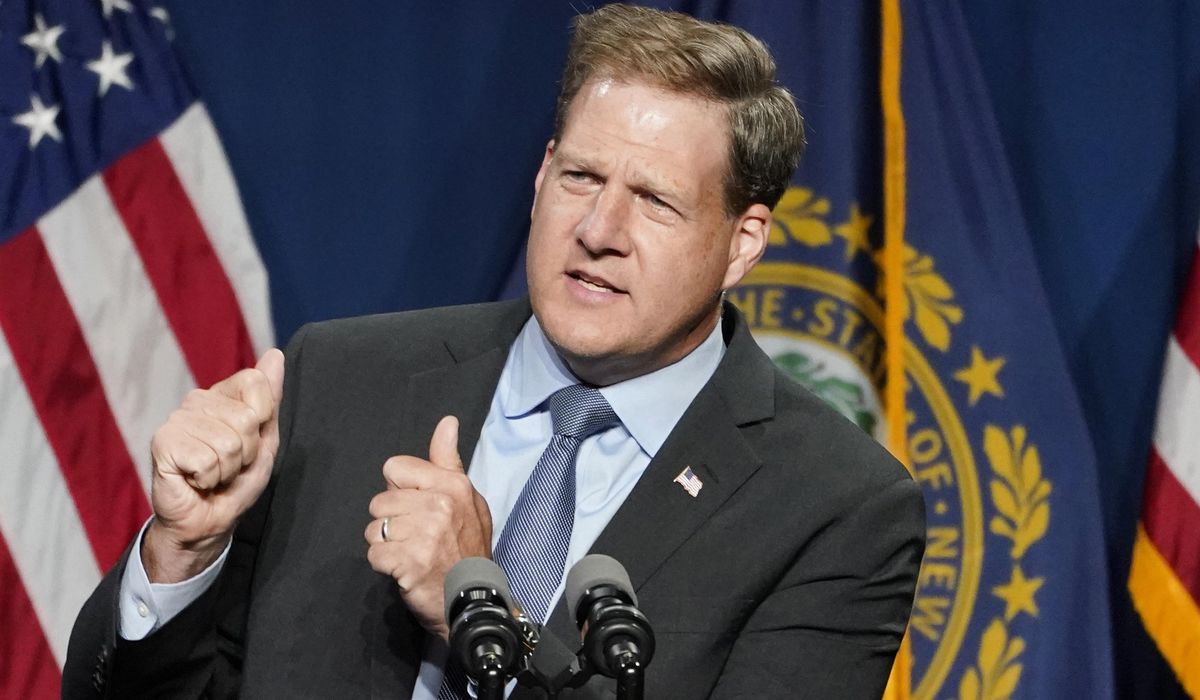


Transgender athlete Maelle Jacques has accumulated title after title in girls’ high school track, but the New Hampshire teen’s winning streak may be coming to an end.
On Gov. Chris Sununu’s desk is House Bill 1205, a Fairness in Women’s Sports measure that would bar boys from girls’ scholastic sports in grades 5-12 based on sex at birth. The bill passed both GOP-controlled houses with no Democratic votes.
Also awaiting a decision by the Republican governor is House Bill 619, which bans genital gender-reassignment surgery for those under 18.
Mr. Sununu, a Republican, has not announced whether he will sign the legislation, but Terry Schilling, president of the American Principles project, said that “both of these bills should be very easy for the governor to sign.”
“There’s no question that voters are supportive of these efforts,” he told The Washington Times. “Almost every poll has shown the vast majority of Americans believe that males should not compete in female sports and that children should not be subjected to sex-change procedures. There’s also no question that action is necessary.”
If the governor signs HB 1205, New Hampshire would become the 25th state to bar male-born athletes from female scholastic sports at the secondary level, collegiate level, or both.
“What Governor Sununu does at this critical moment will have a significant impact on his political legacy,” said Mr. Schilling. “We urge him to do the right thing by standing with New Hampshire families and signing these bills.”
On the other side is the American Civil Liberties Union of New Hampshire, which called the bill “a trans-exclusionary sports ban that would prohibit trans Granite Staters from participating on sports teams that align with their gender identity.”
Protesters marched Wednesday into the statehouse in Concord and lined the halls outside the governor’s office waving LGBTQ flags and chanting “which side are you on,” as captured on video clips posted online.
Advocates for transgender athletes insist bills such as New Hampshire’s are a solution in search of a problem, given the small number of such competitors in scholastic sports.
In New Hampshire, there have been five known male-to-female transgender competitors in the last few years, according to a tally by the New Boston Post, including hurdler CeCe Telfer, who became in 2019 the first biological male to win an NCAA women’s title.
About 23,300 boys and 19,400 girls competed in high school sports in New Hampshire in the 2018-19 academic year, according to Statista.
Surveys also show the number of transgender youth is rising. Advocates for single-sex sports argue that just one male-to-female transgender athlete is capable of depriving dozens if not hundreds of girls of trophies, roster spots, playing time, and scholarship opportunities.
For example, Maelle Jacques, the reigning state champion in the high jump, has notched 50 top-10 finishes in the high jump, long jump, 1600-meter race, and 1500-meter race during the 2022-23 and 2023-24 indoor and outdoor track seasons, as shown on Athletic.net.
At the May 18 Wilderness Track and Field Championship, the Kearsarge Regional High School sophomore won the girls’ outdoor contest with a jump of 5’0, which would have been good enough for 11th place on the boys’ side. The winning boys’ high jump was 6’0.
The teen’s dominance in girls’ track has not gone unnoticed. After winning the indoor state high-jump championship in February, the NH Journal ran the headline, “Winner of NH Girls High Jump is Biological Male.”
All-American swimmer Riley Gaines said on X: “Another less than mediocre man atop a women’s podium. He must be so proud.”
Jacques has not broken any rules. The New Hampshire Interscholastic Athletic Association currently allows students to compete based on their gender identity at school.
At a hearing last month before the state House Education Committee, Jacques testified that “being part of the team” was the goal, not winning medals.
“I didn’t join sports with the goal of dominating competition or being better than anyone else,” Jacques told the committee. “No one would go through the bullying and self-hatred of transition purely to win a sport, especially women’s sports, which are underappreciated in our nation.”
The teen continued: “I joined because it’s something I’m passionate about and enjoy.”
Jacques, who transitioned from male to female in sixth grade, also said that competing on the boys’ team isn’t an option.
“Joining the male teams wouldn’t even be a choice for me with the bullying and threats I receive, let alone the mental anguish I’d go through being forced to be someone I’m not,” the student told lawmakers at the April 23 hearing.
The committee killed Senate Bill 375, which would have barred biological males from participating in competitive female sports in high school and college. The bill on Mr. Sununu’s desk only runs through 12th grade, and also creates a private cause of action for injunctive relief.
The legislation comes amid pushback from the Biden administration, which unveiled last month its Title IX rewrite adding “gender identity” to the civil-rights law banning sex discrimination in education.
The Department of Education insisted that the Title IX update does not affect scholastic sports. Another proposed rule on transgender athletic eligibility is expected to be released after the November election.
Mr. Sununu, a popular governor viewed as a moderate, is not running for a fifth two-year term.
• Valerie Richardson can be reached at vrichardson@washingtontimes.com.
